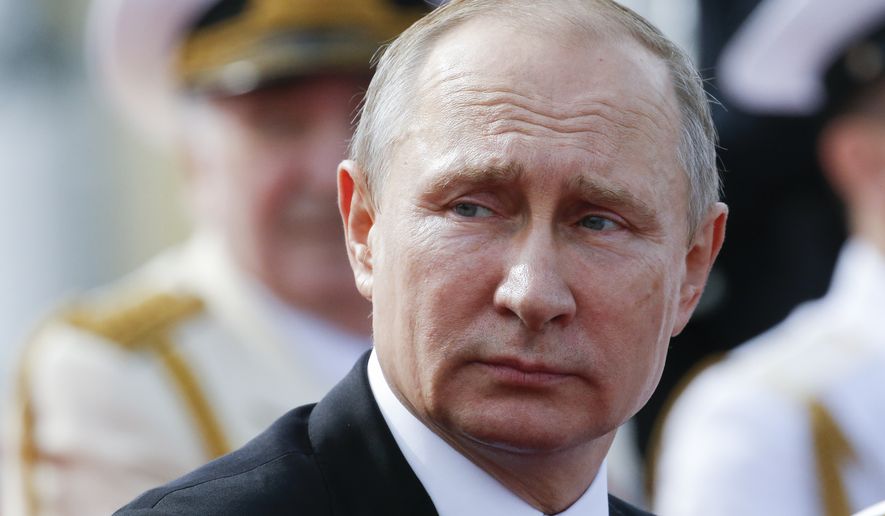The Trump White House is adamant that Moscow will change course on its public threats of diplomatic punishment over the president’s decision to approve stronger U.S. sanctions against Russia.
“As we make our intentions clear, we expect Russian behavior to change. The president and I remain very hopeful that we’ll see different behavior by the Russian government,” Vice President Mike Pence said on his way to Eastern Europe for a trip this week.
“We continue to believe that if Russia will change its behavior, our relationship can change for the good and improve for the interests in both of our countries and the interest of peace and stability in this region and around the world,” Mr. Pence told reporters while traveling on a diplomatic visit in Estonia.
But some hours after his comments, Russian President Vladimir Putin called for the expulsion of over 700 American diplomats attached to the U.S. mission in Russia.
The State Department would have until Sept. 1 to remove 755 U.S. diplomats and technical support staff from the country, Mr. Putin said during an interview with Russian news outlet Vesti TV.
In a statement, the U.S. State Department called Russia’s order “a regrettable and uncalled for act.”
Michael McFaul, former U.S. ambassador to Russia, tweeted Sunday that the Kremlin’s demands would cause a massive delay in Russians seeking to enter the U.S.
Openly questioning whether the U.S. even had over 700 individuals working the diplomatic mission in Russia, their loss would mean months-long delays in issuing visas to Russians looking to travel to the U.S.
“If these cuts are real, Russians should expect to wait weeks if not months to get visas to come to US,” Mr. McFaul tweeted Sunday.
In one of his final acts in office, former President Barack Obama expelled dozens of Russian officials based in Washington, in response to Moscow’s interference during last year’s presidential elections.
Senior Kremlin leaders had already been evaluating a slew of diplomatic and economic options to punish Washington — including expulsion of American citizens — should the White House sign off on congressional legislation easing restrictions on future U.S. sanctions against Russia.
Russian officials have already moved forward with deporting several American citizens, as well as revoking territory in the country now being used as part of the U.S. diplomatic mission Russia.
“This retaliation is long, long overdue,” Russian Deputy Foreign Minister Sergei Ryabkov said Sunday, in response to Moscow’s actions in the wake of Capitol Hill’s approval of the new sanctions bill.
Should President Trump sign the legislation into law, something the White House has already indicated he would do, “we will respond in kind. We will mirror this. We will retaliate,” Mr. Ryabkov added during an interview on ABC’s “This Week.”
The senior Russian diplomat declined to comment on what specific options were being weighed by the Kremlin.
“We are not gamblers … but I can assure you different options are on the table,” he said Sunday, adding that “symmetrical and asymmetrical” options are being weighed, but said it would be “ridiculous to speculate” on what Moscow’s next steps would be.
Mr. Ryabkov’s comments come days after the Trump administration agreed to sign off on the new sanctions bill, which prevents the president from curtailing or blocking outright any diplomatic sanctions against Russia or other U.S. adversaries instituted by the Obama White House.
It also prevents the White House from softening any future sanctions Washington may impose on Moscow.
After the vote, the White House and State Department expressed resignation on whether the administration would approve the legislation, which had passed overwhelmingly with veto-proof supermajorities.
But on Friday, press secretary Sarah Huckabee Sanders said would Mr. Trump will sign the Russia sanctions bill, noting the president had secured important changes to the legislation.
• Carlo Muñoz can be reached at cmunoz@washingtontimes.com.




Please read our comment policy before commenting.